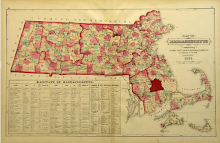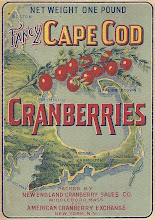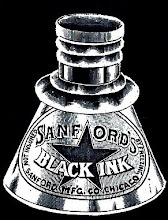Wednesday, September 5, 2012
The Inhospitable Hotelkeeper
Jeremiah (“Jerry”) Cohan (1848-1917), father of George M. Cohan, was a noted vaudevillian during the late 19th and early 20th centuries. Though Cohan would later be best known as one of the “Four Cohans” which also included his wife Helen (“Nellie”) Costigan Cohan, son George and daughter Josie, Cohan toured successfully as a solo performer during the 1870s and 1880s, visiting many cities and small towns, including Middleborough. Though the date and details of Cohan’s visit are not known, it probably occurred during the mid-1870s. What is known is that Cohan enjoyed a less than satisfactory stay at one of the local hostelries, thanks to an inhospitable hotelkeeper, with Cohan later leaving his experience on record. The hotelkeeper in question was in all probability Levi B. Miller, who was proprietor of the Nemasket House on North Main Street during the period that Cohan is likely to have visited and who had previously kept a hotel at Malden, Massachusetts. Miller was born in Maine (thereby fitting Cohan’s characterization as a “’Way Down East’ landlord”). The daughter mentioned would have been Hattie Miller. Though Cohan may have felt poorly treated by the Millers’ lack of hospitality, he also found amusement in their country ways as indicated by the following account which appeared in the New York Times in 1903:
Jerry J. Cohan, of the Four Cohans, commenced his career when he was a boy about sixteen years old. He was a dancer, and in those days considered the champion clog dancer of the country. Mr. Cohan travelled with the Harrigan Hibernica Company, and besides doing his dancing specialty, also lectured on the panorama used in the show. They played many cities and towns from the Atlantic to the Pacific and seldom overlooked a “stand,” whether it was on the map or not and even if obliged to play in the school house. In relating his experience Mr. Cohan tells of many funny incidents that have happened en route; one in particular is concerning the town of Middleboro, Mass., where it is alleged the author of the “Country Circus” got his idea for that once famous play.
“There were about fifteen people in our company,” relates Mr. Cohan, “and we were all obliged to stop at one hotel. At the dinner table all our company had been seated, including Mrs. Cohan, when I appeared in the dining room, and the landlord’s daughter, who was head waitress, assistant, and, in fact, the entire force of waiters, insisted ‘that I set at a separate table.’ I did.
“This caused a great deal of merriment among the folks, and I decided for the fun of the thing to raise Cain with the proprietor, the girl’s father, so when the dinner was over I hurried to the office and confronted the “Way Down East” landlord and started in to the full extent of my ability. For fully ten minutes I roasted, stormed, and swore at the treatment I received and, after being thoroughly exhausted, I quit. To my surprise the old landlord yawned, stretched his arms over his head, and replied:
“'Wa’ll, I don’t know as your talk is goin’ to scare anyone ‘round here.'
“After the laughter died out I asked for writing paper and envelopes and was informed by Mr. Hotelkeeper that he did not run a stationery store. Oh! The place was an exceptional hit to all of us. Harry Steele, one of our company, asked to be called at 7 A. M. and was informed that he would be called when they saw fit, but we were all obliged to wake up at 5:30 A. M. and catch an early train. When we came down stairs to the office the county Sheriff stood at the desk until all our board bills were settled, and then we departed wondering when we would play Middleboro again.”
Illustration:
The Four Cohans, photograph, 1888.
The photograph depicts Jeremiah and Helen Cohan with their son George M. and daughter Josie about 10 years after Mr. and Mrs. Cohan visited Middleborough. The foursome would later become nationally famous as the "Four Cohans", and Jerry would draw upon his experience in Middleborough when performing the country "rube".
Source:
New York Times, “Stageland Gleanings from Here and There”, May 24, 1903
Subscribe to:
Post Comments (Atom)























+of+Smoky+Mountains+018.jpg)
0 comments:
Post a Comment